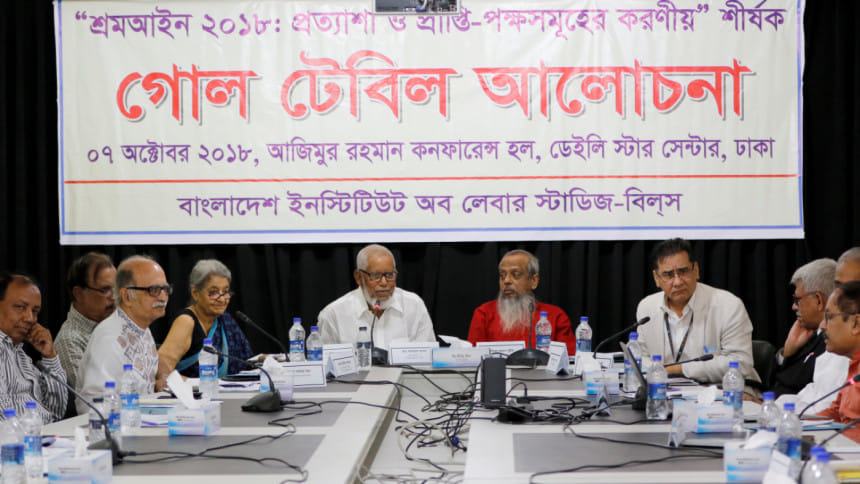Abolish limits on workers' participation: experts

Experts yesterday called for removal of an “unfeasible demand” in the labour law: a provision stipulating that 20 percent of a factory's workers have to participate for a trade union to be formed.
“(Achieving) 20 percent participation is not possible,” said AKM Nasim, a labour law specialist.
He was addressing a roundtable styled “Labour Act 2018: expectation and attainment– responsibility of stakeholders” organised by the Bangladesh Institute of Labour Studies at The Daily Star Centre in Dhaka.
The amended Bangladesh Labour (Amendment) Act, 2018 will be placed in an upcoming session of parliament.
The labour law was originally framed in 2006 to protect workers' rights and to increase productivity in the industrial units. It was amended in 2013.
The cabinet again approved an amendment to the labour law last month to make it more worker-friendly.
The proposed amendments will mainly favour the owners as the workers are not aware of their rights, Nasim said. The amendment of the law will not safeguard the jobs of female workers, said Hameeda Hossain, a human rights activist.
The law states that a four-month maternity leave was mandatory for expecting mothers but the owners either offer the leave without pay or hand in termination letters, she said.
“So, this clause should be corrected to ensure the rights of female workers,” Hossain said.
She also demanded the incorporation of services provided by housemaids under the proposed labour law so that they could also enjoy benefits.
Regarding payment of compensation in case of industrial accidents, she said Tk 2 lakh was too scanty for workers.
“The price of a worker's life is only Tk 2 lakh. This is inhumane. The owners want to give nothing,” she added.
The government officials who were tasked with amending the labour law did not care to hear out the workers' grievances and went about doing the bidding for factory owners, said Razekuzzaman Ratan, general secretary of Samajtantrik Shramik Front.
The proposed amendments to the law do not reflect the four recommendations made by International Labour Organization, said Gagan Rajbhandari, deputy country director of its Bangladesh office.
The proposal to have a minimum number of members in a trade union will have little impact on the formation in a large factory, he said.
Rajbhandari also expressed dissatisfaction over a clause that counted attendance signature in the consultancy meeting as consent for the proposed law.
Md Zafrul Hassan, executive director and joint secretary general of the BILS, said they would place a set of recommendations to the parliamentary standing committee on labour and employment before the passage of the bill.
Mujibar Rahman Bhuiyan, vice-chairman of the BILS, presided over the roundtable. Md Shahidullah Chowdhury, member of advisory committee of the BILS; Mesbah Uddin Ahmed, advisory member of the BILS; and Syed Sultan Uddin Ahmmed, executive director of the BILS, also spoke.

 For all latest news, follow The Daily Star's Google News channel.
For all latest news, follow The Daily Star's Google News channel. 



Comments